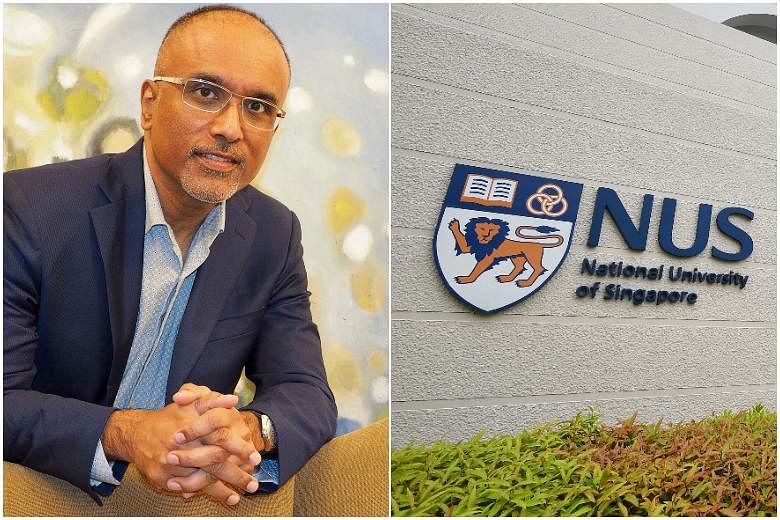SINGAPORE - Hong Kong-based media professor Cherian George was granted approval to deliver a public lecture at the National University of Singapore (NUS) only on the day of the lecture itself because of an "oversight", the university said on Wednesday (March 14).
"We regret that our internal administrative process took longer than expected due to an oversight, leading to this unfortunate incident," an NUS spokesman said in response to queries from The Straits Times. The spokesman added that Dr George has accepted an invitation to give a talk at the university on March 28; it will be open to NUS staff and students.
In a blog post last Friday, Dr George, a Singaporean who formerly lectured at Nanyang Technological University (NTU), said that he accepted an invitation last December from Professor Mohan Dutta, head of NUS' Department of Communications and New Media, to deliver a public lecture.
The date of the lecture, which was titled Rethinking Censorship In An Age Of Authoritarian Resilience, was fixed for March 9.
But Prof Dutta was later "forced to ask for a rain check" last week due to the delay in securing approval, and there was no longer time to make travel arrangements and publicise the lecture even if approval was suddenly granted, wrote Dr George.
In February, he was also told that "all visitors to the Faculty of Arts and Social Sciences are subject to screening".
Official approval to give the lecture was granted only at 3pm last Friday, and no explanation was offered for the nature of the screening or why it had taken so long, he added.
Dr George said that during his time at NTU from 2004 to 2014, he had "never encountered any rule requiring us to seek permission before inviting a speaker".
He added that his friends at NUS were "surprised" to learn of the screening requirement that his talk had been subject to.
"In my time as an academic, I have given talks on campuses in around 25 countries. This is the first time that an invitation to speak has been, in effect, voided. It's the kind of hitch that I'm mentally prepared for if I need to deal with universities in the People's Republic of China. I wasn't expecting it from my own country," wrote Dr George, who is also a former Straits Times journalist.
He was twice denied tenure in 2009 and in 2013 when he lectured at NTU's Wee Kim Wee School of Communication and Information - though he was promoted to associate professor. This led to speculation that the tenure denial was politically motivated because of Dr George's past criticism of the Government. Former NTU president Bertil Andersson later disputed this. Dr George later wrote on his blog that he was told of a "perception" that his writing could pose a "reputational risk" to the university in the future. The university had since declined to comment further.
In his post, Dr George called for the NUS to make its policies more transparent, and to openly declare the screening process that applies to visitors, which NUS had told him was "standard procedure".
"Guest speakers should be informed at the outset that the invitation is subject to vetting that is outside the organiser's control. They can then make an informed decision about whether to accept the invitation," he wrote.
In an update to the blog post on Monday, Dr George said that he has been reinvited by NUS and has agreed to speak at the university later this month. "I was in two minds about whether to say 'yes', in case it's seen as accepting of a process that treats Singaporeans this way. But I don't doubt (Prof Dutta's) sincerity in inviting me. And, I'd like to believe that collegiality still has a place in academia," he wrote.
When contacted by The Straits Times, he declined to comment on NUS' statement.
Separately, NUS also said that it was "not aware" of a private exchange between Singaporean academic Thum Ping Tjin and a senior staff member of the university that was mentioned in an Al Jazeera news report on Singapore politics, published on Feb 28.
In the video report, Dr Thum, who was a research fellow at NUS' Asia Research Institute (ARI) from 2012 to 2014, said that he was "privately informed" by someone senior in the university that he "would never be able to work in Singapore as an academic as part of the formal academic system again" after he began publishing and giving lectures about his research, which had "proved that (the late founding Prime Minister Lee Kuan Yew) had lied about his use of detention without trial from the 1960s onwards".
The NUS did not comment on the validity of the report's claims that Dr Thum had been penalised for his research on the late Mr Lee. The spokesman said that Dr Thum resigned from the ARI in October 2014.
Additional reporting by Yasmine Yahya and Tham Yuen-C


